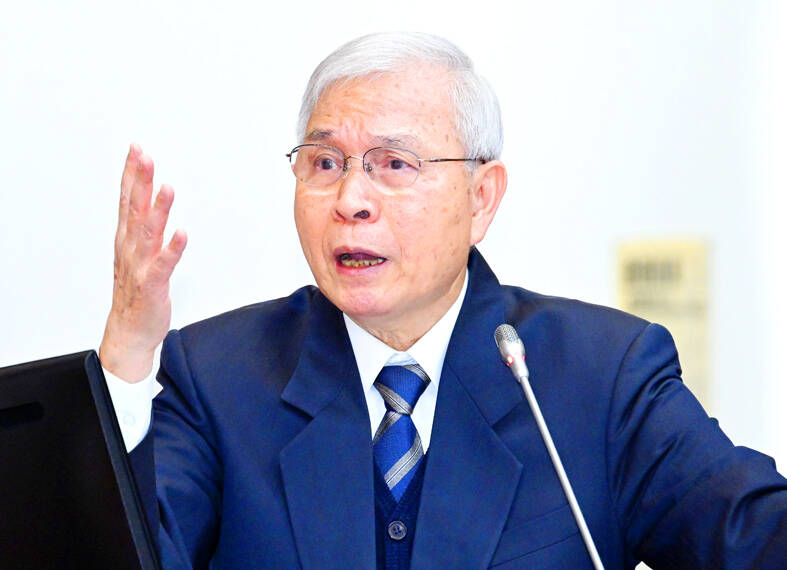The central bank spent a record amount of money defending the New Taiwan dollar last year and might need to do more, given worsening stock market outflows and escalating trade tensions.
Central bank Governor Yang Chin-long (楊金龍) presented a report to legislators yesterday morning, saying that the central bank sold US$16.4 billion on a net basis in the foreign exchange market last year. The US dollar sales were a third year in a row and the most since 2018.
“Together with Trump 2.0-induced uncertainties, concentrated and massive short-term foreign capital flows bring challenges to the stability of our foreign exchange market,” the report said.

Photo: Liao Chen-hui, Taipei Times
The New Taiwan dollar declined more than 6 percent against the US dollar last year, extending its losing streak to three years. It has fallen another 0.5 percent this year amid the worst-ever selling streak by foreign investors in its stock market as heavyweight Taiwan Semiconductor Manufacturing Co (TSMC, 台積電) fell out of favor.
Foreign investors are increasingly influential for Taiwan’s equities, as an artificial intelligence (AI) frenzy led to a surge in demand for TSMC. The market value of local stocks owned by global funds expanded to 142 percent of the nation’s foreign reserves as of the end of last month, from 69 percent in 2016, the latest central bank data released on Wednesday last week showed.
Still, foreign investors have reduced holdings of Taiwanese equities for the past 12 sessions, shedding a net NT$391 billion (US$11.9 billion), according to exchange data compiled by Bloomberg. They sold a net US$19.5 billion worth of stocks last year.
Shares of TSMC, which accounts for more than a third of the Taiwanese benchmark’s weighting, have fallen about 10 percent this year.
When asked by lawmakers yesterday, Yang toned down the currency impact of TSMC’s latest plan to invest another US$100 billion in its US facilities.
“TSMC doesn’t need to buy US dollars from the forex market, as the money it earned is enough to fund its overseas investment,” Yang said.
Separately, the central bank expects inflation this year to be stable at around 2 percent, though adding it could revise the forecast upward if prices of electricity and railway tickets rise.
“We need to be more concerned about uncertainties over inflation and the economy,” Yang told lawmakers.
Predictions for the consumer price index (CPI) growth rate this year by major financial institutions range from 1.70 percent to 2.30 percent, with an average of 1.95 percent, according to the central bank’s report.
The central bank in December last year predicted that the CPI growth rate would be 1.89 percent this year, which had been above the 2 percent inflation warning threshold for three consecutive years through last year.
Additional reporting by CNA

SELL-OFF: Investors expect tariff-driven volatility as the local boarse reopens today, while analysts say government support and solid fundamentals would steady sentiment Local investors are bracing for a sharp market downturn today as the nation’s financial markets resume trading following a two-day closure for national holidays before the weekend, with sentiment rattled by US President Donald Trump’s sweeping tariff announcement. Trump’s unveiling of new “reciprocal tariffs” on Wednesday triggered a sell-off in global markets, with the FTSE Taiwan Index Futures — a benchmark for Taiwanese equities traded in Singapore — tumbling 9.2 percent over the past two sessions. Meanwhile, the American depositary receipts (ADRs) of Taiwan Semiconductor Manufacturing Co (TSMC, 台積電), the most heavily weighted stock on the TAIEX, plunged 13.8 percent in

A wave of stop-loss selling and panic selling hit Taiwan's stock market at its opening today, with the weighted index plunging 2,086 points — a drop of more than 9.7 percent — marking the largest intraday point and percentage loss on record. The index bottomed out at 19,212.02, while futures were locked limit-down, with more than 1,000 stocks hitting their daily drop limit. Three heavyweight stocks — Taiwan Semiconductor Manufacturing Co (TSMC, 台積電), Hon Hai Precision Industry Co (Foxconn, 鴻海精密) and MediaTek (聯發科) — hit their limit-down prices as soon as the market opened, falling to NT$848 (US$25.54), NT$138.5 and NT$1,295 respectively. TSMC's

TARIFFS: The global ‘panic atmosphere remains strong,’ and foreign investors have continued to sell their holdings since the start of the year, the Ministry of Finance said The government yesterday authorized the activation of its NT$500 billion (US$15.15 billion) National Stabilization Fund (NSF) to prop up the local stock market after two days of sharp falls in reaction to US President Donald Trump’s new import tariffs. The Ministry of Finance said in a statement after the market close that the steering committee of the fund had been given the go-ahead to intervene in the market to bolster Taiwanese shares in a time of crisis. The fund has been authorized to use its assets “to carry out market stabilization tasks as appropriate to maintain the stability of Taiwan’s

STEEP DECLINE: Yesterday’s drop was the third-steepest in its history, the steepest being Monday’s drop in the wake of the tariff announcement on Wednesday last week Taiwanese stocks continued their heavy sell-off yesterday, as concerns over US tariffs and unwinding of leveraged bets weighed on the market. The benchmark TAIEX plunged 1,068.19 points, or 5.79 percent, to 17,391.76, notching the biggest drop among Asian peers as it hit a 15-month low. The decline came even after the government on late Tuesday authorized the NT$500 billion (US$15.2 billion) National Stabilization Fund (國安基金) to step in to buoy the market amid investors’ worries over tariffs imposed by US President Donald Trump. Yesterday’s decline was the third-steepest in its history, trailing only the declines of 2,065.87 points on Monday and